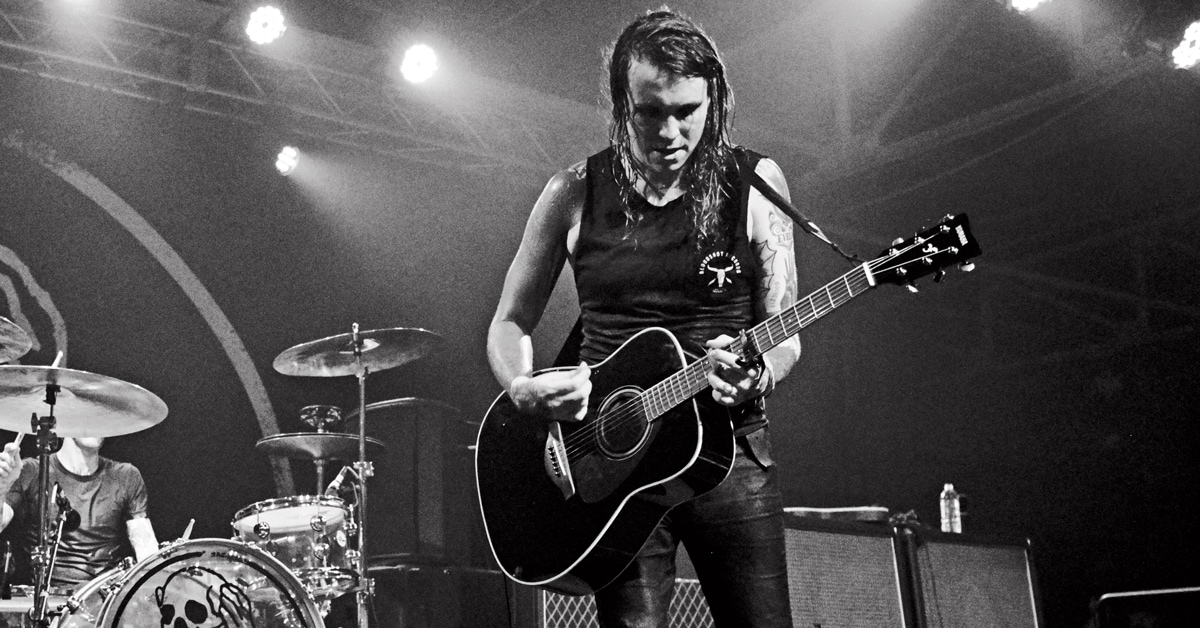Be Heard: Guitar Center is celebrating artists, brands and organizations that are using music to raise awareness on critical issues facing us all, to help us heal, to bring us together—to make the world a better place.
By age 20, Against Me! frontwoman Laura Jane Grace had already survived enough punk rock drama for a lifetime. Family turmoil, drugs, anarchism, legal trouble, punk-house poverty, scene infighting—she did it all, and her cred was unquestionable. That’s why some observers were surprised when, in 2012, her coming out as a transgender woman triggered pushback from members of that same community. After all, aren’t punks supposed to be radical?
“Ironic, isn’t it?” Grace said about that time, laughing.
Her public transition and the visionary album it spawned, Transgender Dysphoria Blues, served as a beacon for transgender fans, many of whom struggled to find acceptance in their own communities. Ask the iconic singer, guitarist and songwriter what music means to her, and that’s the part you will hear about—the intimate connection between the songwriter and the audience.
“No bullshit, the audience is more than half of the show,” she said, speaking to Guitar Center fresh off her performance at Riot Fest. “You can be having the worst day of your life, and if the audience brings it, you're going to have the best show ever.”
Grace insists that the listener can bring just as much to the table as the musician, and if you ask about her own favorite artists, you’ll see that she means it. She jumped at the chance to gush about her fellow acts at Riot Fest, including Riot Grrrl pioneers Bikini Kill and punk icon Patti Smith.
“I've been thinking about Patti Smith’s set ever since,” Grace said, sounding like any other breathless fan. “It was just so incredibly powerful.”
Countless profiles have described how Grace’s transition influenced her music and how that music, in turn, influenced others. But if you take a moment to ask what artists influenced her during her own transition, some of her answers might surprise you.
“I vividly remember being at Motor Studios, which is Fat Mike’s studio in San Francisco, and we recorded three of the songs off of the record there at Motor,” she said about the making of Transgender Dysphoria Blues. “I remember being finished with it, and having a late night by myself in the control room, which was awesome as far as like hooking up my iPod and just listening to whatever I wanted over studio speakers as loud as I wanted. I remember listening to Leonard Cohen late into the night, and the song ‘Chelsea Hotel’ in particular, just like sitting there with my head in hands listening to ‘Chelsea Hotel’ over and over and over again.”
Grace’s music, just like the person herself, is unexpected, brash and achingly sincere all at once. The title track to Transgender Dysphoria Blues is a rollicking punk anthem with a straight-ahead snare beat inspired by Grace’s childhood obsession with Paul Simon’s “The Obvious Child,” but the lyrics paint a surprisingly delicate portrait of her gender transition. It’s a classic example of how music can draw from all corners of a songwriter’s life while still feeling vital to a specific moment in time.
Grace believes this emotional resonance is the key to connecting with an audience, no matter whether the song is about gender transition, politics or simple heartbreak.
“All there is, is love and death. Like you can put different clothes on it, but that’s all anyone is ever writing about,” Grace said. “It’s love or death, you know?”










